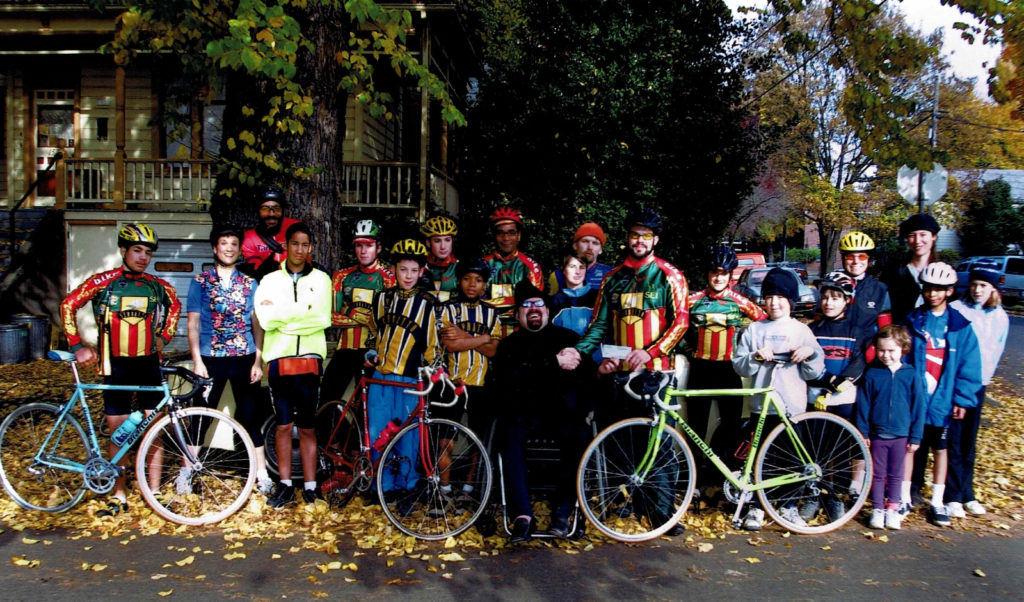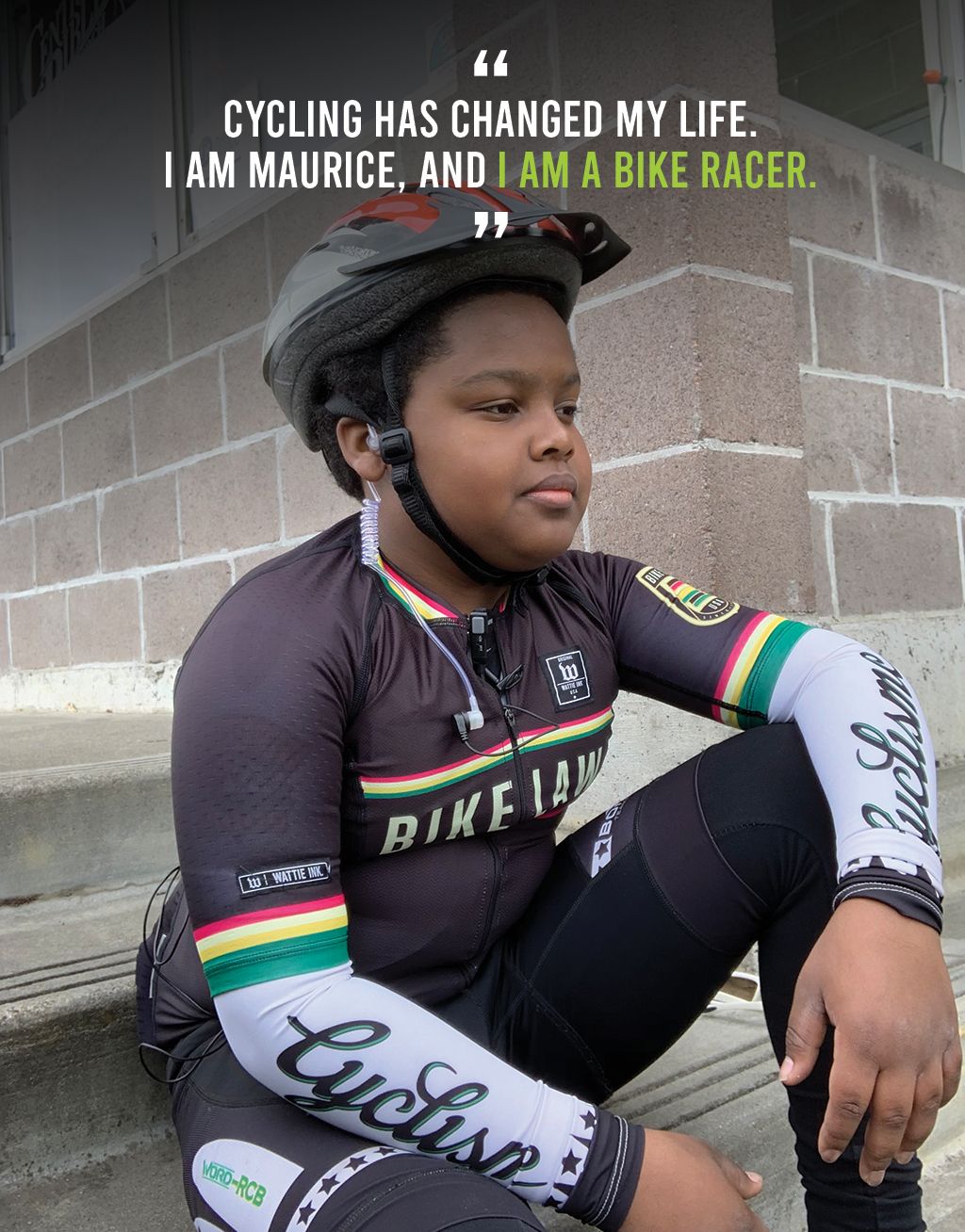Community Profile: Transforming Lives, One Pedal Stroke at a Time
By Rick Bernardi
It’s been said more than once that cycling can save the world. In an era in which we are facing both a rapidly shrinking window for taking climate action and an exploding epidemic of inactivity-related diseases, that truth seems self-evident.
But what about the world of at-risk youth? John Benenate knew that cycling could save their world too, and 25 years ago, he started a non-profit that would make his dream a reality. That non-profit is b.i.k.e. — Bicycles and Ideas for Kids Empowerment — and its mission is succinctly summarized by its motto: “transforming lives, one pedal stroke at a time.”
 The b.i.k.e. brigade. Ken LeGros Photography.
The b.i.k.e. brigade. Ken LeGros Photography.
b.i.k.e. began as an outgrowth of Benenate’s work as the director of the Portland State University cycling program, and later, the Cyclisme Racing Programs. When Benenate began running those programs, cycling had a reputation as an “elitist” sport. Benenate thought that could be changed by building a strong team of dedicated young cyclists who would be able to act as mentors in the larger Portland community, including finding and developing new racers from all walks of life, fitness levels, and ages.
From there, it was a natural next step to use cycling as a vehicle to help at-risk kids. Benenate could see that the kids of b.i.k.e. needed more than bicycle racing to help them, so he added tutoring to the program to help them with their academic progress. A new program, “Riding Bikes to Museums,” was added to introduce b.i.k.e. to schools. Benenate also started “Rollers 101,” a stationary bike program available in youth and community centers in Portland, as a part of the b.i.k.e. program. And as Benenate had envisioned from the start, the Cyclisme racing team provided mentoring and logistical support to the kids of b.i.k.e. That close relationship between Cyclisme and b.i.k.e. is reflected in the Cyclisme team jerseys worn by both the Cyclisme team and the kids of b.i.k.e.
By bringing top cycling talent into the community to mentor at-risk youth, b.i.k.e helps kids develop the resilience that supports them in avoiding the negative behaviors that lead to an at-risk youth becoming another negative statistic. And it’s not just a pie-in-the-sky-hope-this-works effort either. Rather, the program is founded on decades of solid research about at-risk youth, and the factors that help at-risk youth develop the values and life skills they will need to become pro-social, productive adult citizens. The year after Benenate began b.i.k.e., the U.S. Olympic Training Center introduced Benenate to their “Kids on Bikes” program. Benenate immediately took charge of the Kids on Bikes program, and the model he developed became the national model endorsed by USA Cycling and the U.S. Olympic Training Center.
Twenty years ago, Bob Mionske became involved with b.i.k.e., and has been a sponsor and mentored kids in the program ever since. Mionske, an attorney and the founder of Bicycle Law, brings with him his years of pre-law experience as a racer on the amateur circuits, a National Road Race Champion, 8 years on the U.S. National Cycling Team, a two-time Olympian, and a pro racer on Team Saturn. When the kids learn about bike racing from Mionske, they’re learning from somebody who has been there and knows what he’s talking about.
And they’re also learning from somebody who got his own racing start on hand-me-downs and no team support. Mionske knows what that’s like, too. “I was able to get into road cycling because of hand-me-downs and mix-and-match kits and wheels and frames to make something that would roll down the road,” Mionske notes, “and if it were not for that I might not have discovered this great activity that’s changed my life ever since, and I’d like to share my experience with other people.”
Now the rest of the world is beginning to catch on. Bicycling Magazine has been putting increased attention on running articles focused on diversity in cycling. And in Los Angeles, pro cyclist Justin Williams has formed a professional team called L39GION (pronounced “Legion”) with the express goal of making pro cycling more inclusive. With 14 riders on the team (10 of whom are pros), L39GION includes Black, Latino, Pacific Islander, and White racers. And while making cycling more diverse is the point, winning races is also the point. As Williams succinctly puts it, “We wanted to win races while making the sport inclusive.”

And the connections continue to grow. Bicycle Law attorney Bob Mionske has been working with Maurice, 10, one of the kids of b.i.k.e. And Maurice’s older brother and teammate Mateen, 17, is also in the program; their mentor is Denzel, 27. A short video of Maurice and Bob was made last spring, and more videos featuring Maurice, Mateen, and Denzel are in the works for the near future. Recently, Maurice and Mateen traveled to Los Angeles to meet and spend time with Justin Williams and his L39GION program.
“It’s a beautiful experience being around the first rides a cyclist takes, especially if it becomes a lifelong passion,” Mionske says. “You feel like your intersection with them spawns something and you pass something on that you found from someone else. So it’s like a legacy of the sport. But beyond that, these kids need help, and I’ve got a lot of extra bike parts around, and who needs six bikes? When your bike’s a couple of years old, its value goes down quickly, and the value of seeing somebody’s face light up upon receiving an old set of wheels, or a cool jersey, or a pair of shorts and arm warmers, or a bag of arm warmers and leg warmers and jerseys, watching them tear through to find things, reminds me of my first cycling shorts, which were a gift from a friend, hand-me-down wool shorts.”
“So I understand that it’s best that cycling equipment is out in the world being used, as opposed to in boxes and crates,” Mionske continues, “and I would suggest that if most hardcore cyclists looked around in their basement and storage area that they could help a lot of people enjoy our sport. It’s also nice to see some of these kids grow up to be exposed to all the different neighborhoods. If you’re a low-income kid and you’re in a small neighborhood you know that area and the bus routes. But if you get on a bike, all of a sudden you know the whole city, and the outlying areas. And generally, you’re going to be out there looking around with a bunch of people that maybe don’t look like you. So, there’s this cultural mix that happens as well. I think the cycling community in general likes seeing as many people as possible on bikes.”
The kids love it too. As Maurice says in his first video with Mionske “I wasn’t good at sports, I thought, because I didn’t find nothing that I really liked. b.i.k.e. taught me a whole bunch of things, like how to ride a bike better, how to read better, math. It helps you get stronger, it helps you get more exercise, we go to places I’ve never been to. I have confidence in myself every time I race, and if I don’t win, let’s keep going, we’re not going to stop, even if we fall, we’re going to get back up. That’s what it’s all about, training my body, my life, and everything, you know. Cycling is a part of my life now, and people on the team is family to me. It’s something I want to live my whole life doing.”
There’s no better testament to the power of cycling to transform lives.
– – – – –
To learn more about b.i.k.e., visit www.kidsofbike.org.
Have you or someone you know been involved in a bicycle crash? Curious about your rights? Are you a lawyer handling a bicycle crash who wants more information on how to get the best result for your client? Contact Bicycle Law at (866) 835-6529 or info@bicyclelaw.com.
Bicycle Law’s Bob Mionske is licensed to practice in Oregon, its affiliate Coopers LLP has lawyers licensed in California, and either can affiliate with local counsel on bicycle cases across the country to make sure cyclists get the benefit of lawyers who focus on the issues specific to bicycle incidents.
